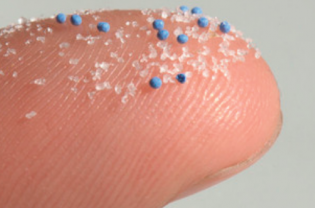Beauty knows no pain – but makes the environment suffer
Cosmetics pollute waters. Blame can be layed on small plastic micro pearls, present in cleaning agents, toothpaste and shower gels. Not only animals take in the toxic substances with their food but also we do.

Everybody knows the small cleansing-agents. In the shower, they scrub off your pimples and the dandruff, when brushing your teeth, they make your smile even brighter, when cleaning, they remove persistent dirt. Polyethylene and polypropylene are the responsible ingredients. Through the drain, they get into our water system, pollute the waste water, the sewage and the sludge demonstrably and get back to our comestible goods via fertilizers. The reason is simple: even the most cutting-edge wastewater treatment plants are not able to filter out the plastic particles that are less than five millimetres in size. The animals living in rivers and oceans easily mistake them for plankton and eat them. Just the same for lugworms, etc. that confuse them with sand. Also birds starved to death are found again and again, even though they seemed well fed. Instead of food, they have plastic in their stomachs. Entire organisms are ruined like that.
Micro pearls with macro impact

These news relate mainly to a scandal in New York for now. However, this is not only a regional issue but a worldwide one. It is known on all sides, that plastic is a controversial, environmentally harmful material. It may also be known that the humans are definitely at the top of the food chain and by this means not only poison uncountable (marine) animals but also themselves. But why is the topic raised only now, when we have been using plastic for the last decades already? The most important question in this case though is why we do not use substitutes for plastic, if it is apparently harmful in every sense? Does a case, such as the one from New York has to be made public first, before the topic reaches out to enough people that want to deal with it and change something? The international status quo is as follows. The EU on the one hand does support a voluntary waiver of micro pearls but does not ban them on the other hand. The global cosmetics industry endeavours to ensure a renunciation of micro pearls until 2018, but if this will be enforced for all the products is questionable. At least in New York, the “Micro-Free Waters Act” prohibits the sale of all products containing the mentioned micro pearls since February 11th: “…to prohibit the manufacture, distribution and sale of personal cosmetic products containing microbeads”. Websites like Plasticontrol and the BUND are responsible for clarification in the German-speaking countries ask for support.
Apropos: Household tips have the same effect but simply disappeared from our awareness. Actually there are harmless household remedies to replace almost every chemical product. To reach a silky-tight skin for example, just hold your face over steaming hot camomile tea and scrub it with a mix of olive oil and sugar afterwards and you will never miss your rough exfoliant ever again.

 share
share tweet
tweet share
share
Leave a Reply